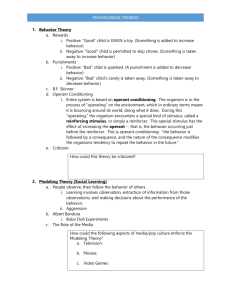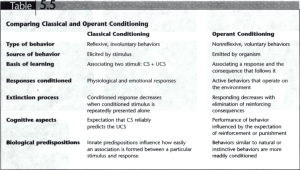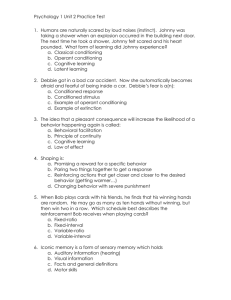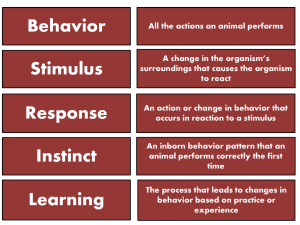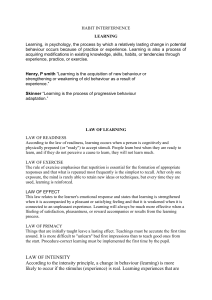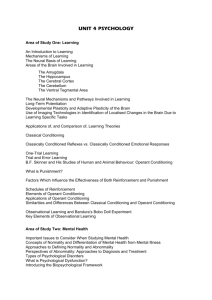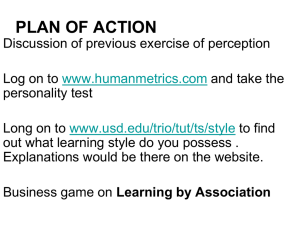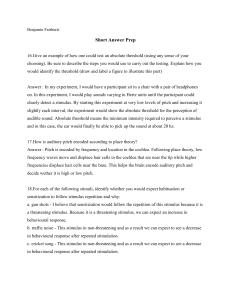Document
advertisement
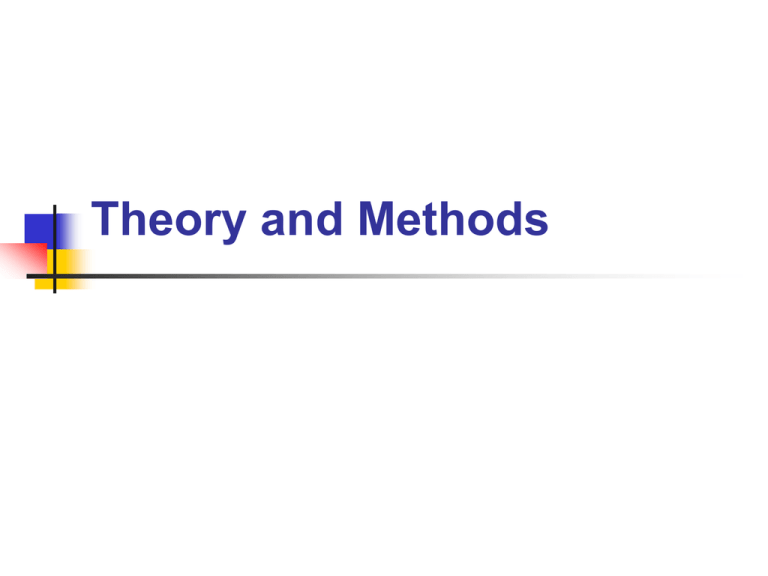
Theory and Methods Learning Theory Define: The more or less permanent change in behaviour potentiality which occurs as a result of repeated practice. • • The change could be permanent or temporary The behaviour does not necessarily have to be observable (fMRI) Learning Theory Classical (Respondent) Conditioning (or Pavlovian Conditioning) Pavlov and Watson - conditioned reflex method Reflex - a biologically determined behaviour that is always elicited by a particular stimulus Behaviour is called respondent behaviour Learning Theory Elements of classical conditioning US (unconditioned stimulus) UR (unconditioned response) CS (conditioned stimulus) It can be perceived and attended Does not elicit UR itself CR (conditioned response) Occurs before UR Smaller in magnitude than UR Form of response may be different than UR Schematic of Elements 1.2 1.2 1 1 0.8 0.8 0.6 0.6 UR 0.4 CS 0.2 US 0 0.4 0.2 CR CS US 0 0 15 30 45 60 75 90 0 15 30 45 60 75 90 Learning Theory Elements of classical conditioning (cont.) CS preceeds US CS overlaps with US in time Example of Acquisition & Extinction CS-US Unpaired CS Alone CS-US Paired Acquisition Extinction -20 -10 0 10 -5 -4 -3 -2 -1 1 2 3 4 5 6 7 8 9 10 1+ 2+ 3+ 4+ 5+ Learning Theory Operant Conditioning (learning) Skinner believed in operant behaviours that are not reflexes but are emitted due to their consequences Response/reinforcer (reward) association Behaviour is an instrument to attain some end Example: rats in a maze to get food T-maze Multiple T-maze: Honzik (1936) Constant Variable 12 10 8 6 4 2 0 Food Box Start 1 3 5 7 9 11 13 Learning Theory: Operant Thorndike - Law of Effect Responses which produce rewards (or positive consequences) will tend to increase in frequency Example: infants and footkicking Learning Theory: Operant Negative reinforcers A response that has the consequence of removing something unwanted Punishers Consequences that reduce the expression of a behaviour Learning Theory Habituation Simplest form of learning Most often used with infants Like classical conditioning, starts with a reflex With repeated exposure to the eliciting stimulus, response declines Dishabituation - the recovery of the reflex response when a new eliciting stimulus is presented Learning Theory Habituation (cont.) most commonly habituated reflexes are the orienting response and the startle response Kellman & Spelke (1983) Habituate Unitary Object Test Two Object Test Social Learning Theory Albert Bandura Observational learning Previous learning was active, whereas in some learning the child is passive and just observes Imitation - Meltzoff deferred imitation Ethology Study of development from an evolutionary perspective Imprinting - interaction between biology and environment Lorenz and chicks Language Visual deprivation Research Methods Theory - A set of expressions put forth as an explanation of facts and empirical findings A good theory makes predictions as yet unknown facts called a hypothesis need to test hypothesis Hypothesis Testing Research Methods Two requirements for testing: 1) objective methods 2) measurable behaviors - morality Types of Research Descriptive - observing and recording Correlational - describes the relation between two variables measured on a -1.00 to 1.00 scale (correlation coefficient) severe limitation - correlation does not indicate causality Correlations Types of Research Experimental - purpose is to draw cause-and-effect conclusions one variable is manipulated - Independent variable effect on the other variable is measured Dependent variable Developmental Research Need to take into account time Longitudinal same subject is studied repeatedly at different ages can be either correlational or experimental Developmental Research Longitudinal (cont.) typically, two types of questions 1) Stability 2) Early Experience Effects Problems subject loss repeated testing effects length of the study Developmental Research Cross-sectional study children at different ages to examine differences in behavior at different ages Problem cannot study stability or earlly experience effects cohort effect - differences are due to different age populations being members of different generations Developmental Research Longitudinal/Cross-Sectional Combo also called cross-sequential design can test for cohort effects & repeated testing examine stability and age differences Microgenetic Examining a small group begining at an age where major development Example: Perception Again, problem of repeated testing Cross-sequential design Developmental Research Case Studies typically used in clinical research study a single individual Problem of generalizing conclusion to whole population Developmental Research Cross-Cultural Comparative compare species to examine evolutionary issues mostly, to do studies not possible in humans

